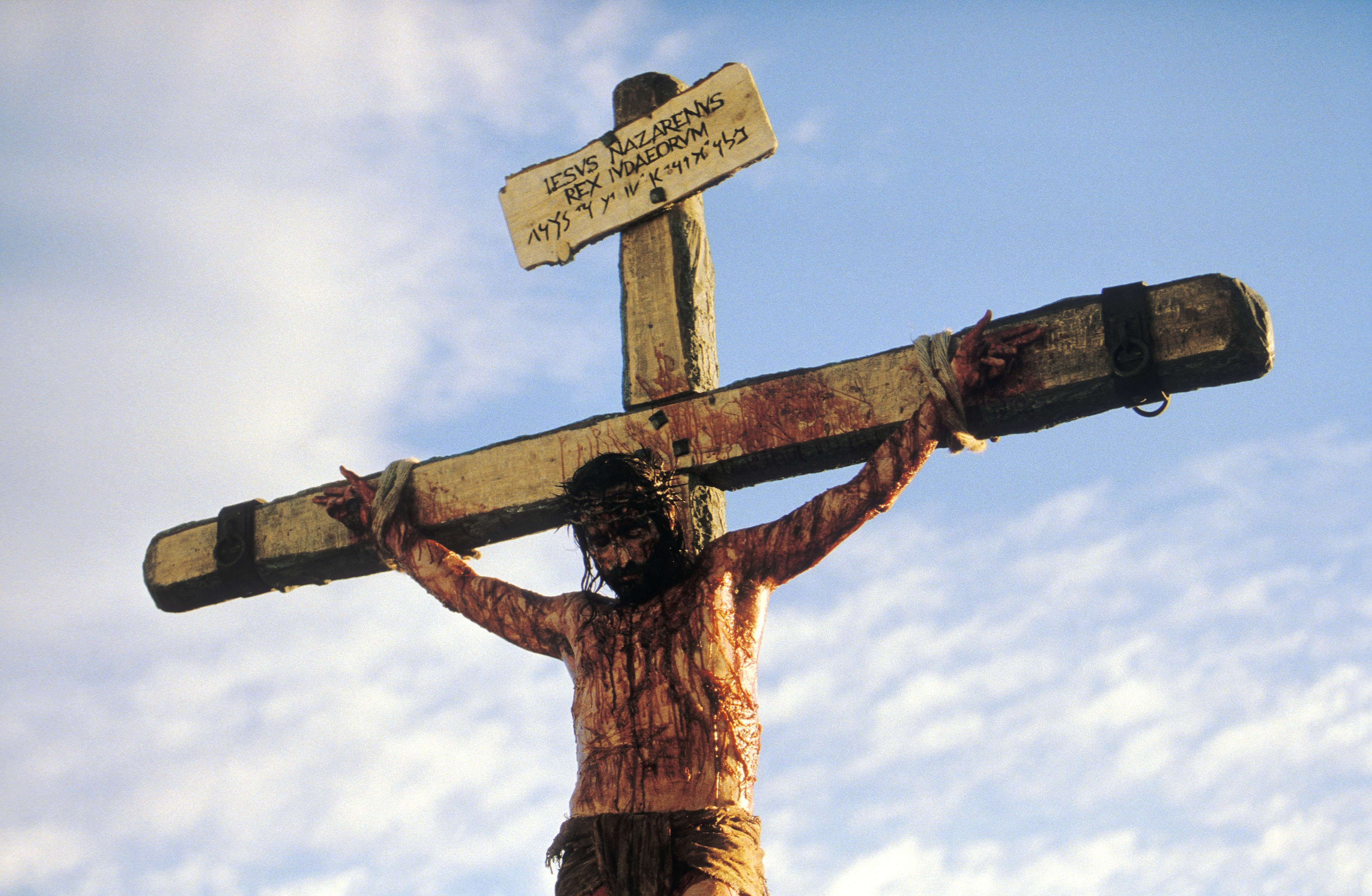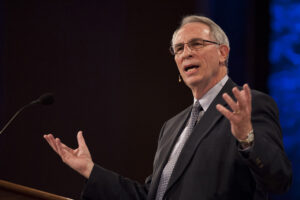
NASHVILLE, Tenn. (BP)–Every Christian knows the challenge of striving to be Christlike. But perhaps none so intimately as actor Jim Caviezel, who portrays Christ in Mel Gibson’s “The Passion of The Christ,” which opens nationwide Feb. 25.
The film depicts the last 12 hours of the life of Christ, covering in graphic detail the trials and brutal beatings Jesus endured at the hands of various authorities leading to His torturous crucifixion. It has garnered national attention not only because Gibson is its superstar director, but also for its intense violence and alleged anti-Semitism. Nonetheless, it has piqued the interest of moviegoers, including a broad spectrum of Christians, who already have pre-purchased millions of tickets.
Officials at Fandango.com, an Internet-based movie ticket provider, told Baptist Press that “The Passion” accounted for 60 percent of the site’s sales last week, four times the sales of second place film “50 First Dates” starring Adam Sandler and Drew Barrymore.
Much of that volume can be attributed to churches nationwide that are using the film as an evangelistic opportunity, buying out entire showings of the film for church members to invite non-Christian friends and family members.
Caviezel, a devout Catholic all his life, said for him, being a Christian is a continual conversion process — a process that he feels helped him get through filming The Passion.
“When I came into [the film], I was operating from a head level,” Caviezel told Baptist Press in a telephone interview Feb. 9. “And makeup times were from 2 in the morning till 10. And I experienced a shoulder separation while carrying the cross, hypothermia every day. The time of rest was getting less and less. The physical pain was becoming overwhelming … . It came to a point where I needed to get into my heart — to literally pray from the heart … .
“How do you do this? By beginning to pray, starting to pray. Then grace comes.”
Caviezel said while his faith helped him during filming, it was not a prerequisite for his getting the role.
“What’s important is that Mel hired me based on what he felt I could do in the work,” Caviezel said. “And I think that’s important to note.
“If you had someone work on your house, do you say, ‘Are you a Christian?’ [The person replies,] ‘I’m not, but I just built the Eiffel Tower in Paris.’ [And you reply,] ‘I’m sorry. I only hire Christians.’ That’s not good.”
Caviezel first met Gibson when producer Steve McEveety (who would produce The Passion) invited him to talk about a role in a surfing movie.
The two talked about the movie for a while, but the meeting took an unexpected turn.
“About an hour into it, Mel Gibson shows up,” Caviezel said. “It kinda threw me, so I said hello. We talked. … The subject kind of changed and we were talking about what Christ really went through. He was talking about subject matter, and he was talking about other films that had been done and how they hadn’t really shown that side.
“And I stopped him, and I said, ‘You want me to play Jesus, don’t you?’
“And he took a big whiff on his cigarette, and he goes, ‘Yeah.'”
The next day Gibson, a fellow Catholic, called to discuss plans for the film, Caviezel recounted.
“He said, ‘You sure you wanna do this?’ And I said, ‘Yeah.’ And it was as if he was trying to talk me out of it. He said, ‘It’s gonna be rough, you know.’ I said, ‘Well, we’re all called to carry our cross. If we don’t carry it, we’re gonna be crushed by the weight of it.'”
So the project, which had been ruminating in Gibson’s mind for 12 years, began. It took five months to complete — five weeks for the crucifixion scene alone, a scene which required Caviezel to be suspended on a cross on top of a mountain, with most of his body exposed to stiff wind and temperatures in the 40s. He even was struck by lightning.
The agonizing schedule took its toll, but Caviezel said the Holy Spirit’s presence often was felt on the set. In fact, Gibson has said the cast and crew witnessed miracles and even conversions during the filming.
“Yeah, but you don’t feel it all the time,” Caviezel said. “There’s also trials and testing going on. … But I can answer for myself that I was profoundly moved by it. And I think, in all respect, the things that I experienced, I won’t ever make public because it’s personal. But it led me in the right direction.”
While accepting the role was an easy decision for Caviezel, he has not always been presented with such good material.
He said he turns down roles “all the time” because they’re not his style.
“I look at it as I feel I have a responsibility,” he said. “I’m not really into doing things gratuitously. People say, ‘Ah, but you played The Passion.’ But that’s different. That’s not gratuitous. … You see this as violence. We see this as a sacrifice. One is aimless — no hope. This is love and total self-giving.”
And what of these roles he turns down? Are Hollywood’s actors and producers who are not so discriminating about their subject matter responsible for what some see as the demise of American culture?
Not entirely, Caviezel said.
“The problem is every person that comes to Hollywood is making a decision what they want to do. You have to make a decision to uphold your values when you come here.”
He also blames the public for supporting entertainment they may find offensive. He likens it to buying supermarket gossip magazines. “You see, when you’re in the Safeway and you don’t like tabloids, and [still] you buy them. So, you keep them in business. You are paying into that culture.”
Caviezel, who has starred in well-known films like “Frequency,” “Thin Red Line” and “The Count of Monte Cristo,” sees his career as more than a way to fortune and fame.
“It’s a definite calling. I definitely want to be doing what God wants me to do, not what I want to do,” he said. “… I look for redeemable roles. And that doesn’t mean I won’t play evil characters. It means the story itself has to be redeemable. Evil has a truth. And behind that truth, a lot of it is seduction. And so to show that side of the story is very powerful.”
Caviezel feels The Passion was another way to do that.
“[Through the film], we wanted to unveil the barbarity of human beings — unveil sin, which is a three-letter word we don’t talk about,” he said.
But he hopes The Passion will open viewers’ eyes.
“It’s part of that continual conversion process that we talked about,” he said. “I don’t think you can’t be changed [by the film].”
He said that’s why the film is so graphic and realistic in its portrayal of the brutality to which Christ was subjected.
“If 1.8 billion Christians change their hearts, this world changes dramatically,” he said. “Even if 10 percent of them changed — if people started to get to that place in their heart instead of their head. … [The world] would be more of a place where truth can exist.”
Because the punishment inflicted on Jesus is called for by a crowd of Jews, some have labeled the film anti-Semitic, a charge Caviezel said is groundless.
“I think like all humanity, there are good people, indifferent people and bad people,” he said. “In this film, you’ll see some very sympathetic people — like Mary, the apostles, Simon the Cyrene and some of the religious leaders even. And some indifferent people and some not-so-sympathetic people. But there is no broad brush here applied to any group. This film does not play the blame game. That particular crowd yelling before Pontius Pilate does not condemn an entire race for Christ’s death. … We’re all culpable for the death of Christ. My sins, your sins put Him on that cross. That’s what this is about.
“My Jewish brothers and sisters out there, I’d say any that have seen this film will quickly realize it is about love, sacrifice, forgiveness and hope. It’s not about assigning blame. Every one of us is to be blamed for the death of Jesus.”
But will everyone grasp that concept of universal blame?
“Nobody that watches this film watches it passively,” Caviezel said. “It doesn’t accept passive onlookers. But it’s very universal. It’s about the mystery of love, sacrifice. I mean, who doesn’t ponder these things? You can’t ask them not to ponder them. And at that point — if a person finds it — either they will or they won’t. You can’t tell someone to get it.
“A big part of Christ’s suffering in Gethsemane was the fact that even though he was going to suffer this much, people would still say no — that they would not see his love. People are gonna watch this film and they won’t see it. And many Christians won’t see it. That’s what’s amazing. I’ve talked to some ministers and priests, and they’ve said, ‘Well, it’s a little too gory.’
“[They’re] missing the whole point of it.”
Caviezel understands that many will not accept or even comprehend the film’s message. Even among Christians, there will be different interpretations and inferences. People should be totally honest about their beliefs, even at the risk of offending someone, he said. But at the end of the day, we must “agree to disagree.”
“It’s not going to be me that converts you,” Caviezel said. “It’s going to be the Holy Spirit.”
And for the millions who will see the film?
“I pray that people don’t see me, they see Jesus,” he said. “That’s it.”
–30—
(BP) photos posted in the BP Photo Library at http://www.bpnews.net. Photo titles: JIM CAVIEZEL and PRAYING THEY SEE JESUS. For information on using The Passion in outreach, resources are available on the Web from LifeWay Christian Resources at www.lifeway.com/passion.
















